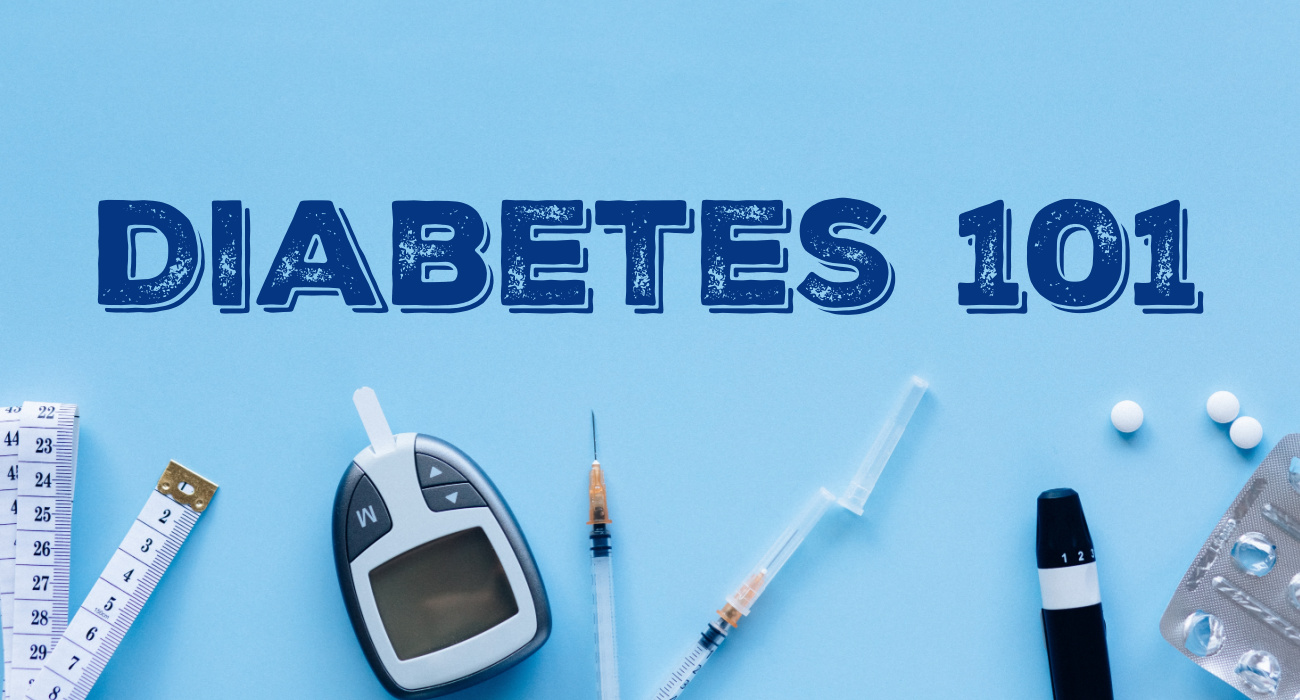Diabetes 101: An Introductory Guide for Better Health
Diabetes affects around 12% of people in the United States. To understand diabetes, let’s start with insulin. Insulin is a hormone made by your pancreas, and it helps move sugar, or glucose, into your body’s cells. Your cells use glucose as energy.
Diabetes happens when your pancreas’s beta cells either can’t produce enough insulin or when your body can’t use insulin properly. There are two main types:
- Type 1 Diabetes: This occurs when your pancreas can’t make any insulin. It’s less common, affecting only about 5% of those with diabetes.
- Type 2 Diabetes: In this more common type, your pancreas can still make insulin, but not always enough. Type 2 diabetes affects 90-95% of the 26 million Americans with diabetes.

There’s also a condition called pre-diabetes, which is a warning sign for Type 2 Diabetes. It often shows no symptoms, but early diagnosis and lifestyle changes like a better diet, exercise, and maintaining a healthy weight can prevent more serious issues.
Gestational diabetes is a form that only happens during pregnancy. You can still have a healthy baby if your glucose levels are well controlled. Sometimes, it goes away after childbirth. If not, and if your blood sugar is too high due to hormones from the placenta, consult an endocrinologist, a specialist who can guide you on managing this condition effectively.
Remember, diabetes can affect anyone. Type 1 typically starts in people under 20, while Type 2 is more common in those over 45. Unfortunately, due to lifestyle factors, even younger individuals, including children, are now being diagnosed with Type 2 diabetes.
The key to good health lies in keeping your blood sugar levels within the range recommended by your doctor. This requires regular monitoring and adjustments to insulin, food, medications, and activities.
Risk Factors for Type 2 Diabetes
Several factors can increase your risk of developing Type 2 Diabetes, including:
- Being overweight or obese
- Having a family history of Type 2 diabetes
- Lack of regular exercise
- Low levels of HDL cholesterol
- High levels of triglycerides
- High blood pressure
- Belonging to certain ethnic groups like African Americans, Latinos, Native Americans, and Asian Americans, who are at higher risk
Detecting Diabetes
The only way to know if you have diabetes is through testing. Sometimes, diabetes develops without any noticeable symptoms. However, many people experience symptoms, regardless of the type of diabetes. These symptoms may include:
- Excessive thirst
- Dry mouth
- Frequent urination
- Fatigue and weakness
- Blurred vision
- Increased hunger, especially after eating
- Frequent skin, urinary tract, or vaginal infections
Managing Diabetes
Don’t fear diabetes—it’s indeed a serious, chronic condition, but many people with diabetes lead long, healthy lives. The key to good health lies in keeping your blood sugar levels within the range recommended by your doctor. This requires regular monitoring and adjustments to insulin, food, medications, and activities.
Knowledge is power, and you play a central role in your diabetes care team. Your endocrinologist will rely on your honest communication and information about your body. Additionally, you might need other healthcare professionals on your team, such as a dietitian, eye doctor, podiatrist, dentist, and even an exercise trainer.
Neglecting proper diabetes care can lead to severe and life-threatening complications, including blindness, amputation, heart disease, and stroke. However, diabetes is manageable. Work closely with your endocrinologist to develop a comprehensive diabetes management plan that includes diet, exercise, and medication to help you achieve your blood sugar goals. Your health and well-being are the top priorities.




